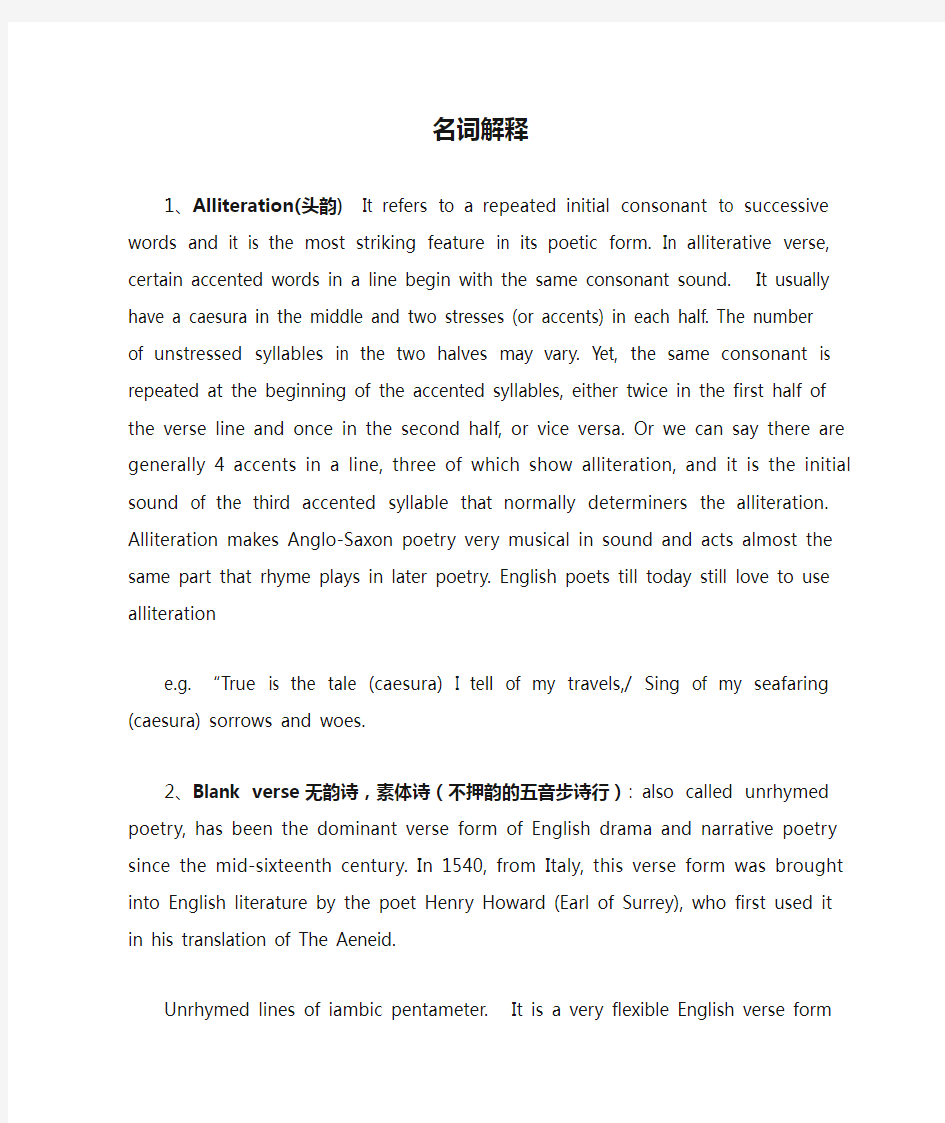英国文学最全名词解释

- 1、下载文档前请自行甄别文档内容的完整性,平台不提供额外的编辑、内容补充、找答案等附加服务。
- 2、"仅部分预览"的文档,不可在线预览部分如存在完整性等问题,可反馈申请退款(可完整预览的文档不适用该条件!)。
- 3、如文档侵犯您的权益,请联系客服反馈,我们会尽快为您处理(人工客服工作时间:9:00-18:30)。
名词解释
1、Alliteration(头韵) It refers to a repeated initial consonant to successive words and it is the most striking feature in its poetic form. In alliterative verse, certain accented words in a line begin with the same consonant sound. It usually have a caesura in the middle and two stresses (or accents) in each half. The number of unstressed syllables in the two halves may vary. Yet, the same consonant is repeated at the beginning of the accented syllables, either twice in the first half of the verse line and once in the second half, or vice versa. Or we can say there are generally 4 accents in a line, three of which show alliteration, and it is the initial sound of the third accented syllable that normally determiners the alliteration. Alliteration makes Anglo-Saxon poetry very musical in sound and acts almost the same part that rhyme plays in later poetry. English poets till today still love to use alliteration
e.g. “True is the tale (caesura) I tell of my travels,/ Sing of my seafaring (caesura) sorrows and woes.
2、Blank verse无韵诗,素体诗(不押韵的五音步诗行): also called unrhymed poetry, has been the dominant verse form of English drama and narrative poetry since the mid-sixteenth century. In 1540, from Italy, this verse form was brought into English literature by the poet Henry Howard (Earl of Surrey), who first used it in his translation of The Aeneid.
Unrhymed lines of iambic pentameter. It is a very flexible English verse form which can attain rhetorical grandeur雄伟壮观while echoing the natural rhythms of speech. It was first used by Henry Howard, Earl of Surrey, and soon became a popular form for narrative and dramatic poetry.
E.g. Paradise Lost by Milton
3、Comedy of humours: The comedy of humours is a genre of dramatic comedy that focuses on a character or range of characters, each of whom exhibits two or more overriding traits or 'humours' that dominates their personality, desires and conduct. the English playwrights Ben Jonson and George Chapman popularized the genre in the closing years of the sixteenth century. In the later half of the seventeenth century, it was combined with the comedy of manners in Restoration comedy.In which the prevailing eccentricities and ruling passions of character are exposed to ridicule and satire
E.g. Every Man in His Humour
Every Man out of His Humour
4、Dramatic monologue:a kind of poem in which a single fictional or historical character other than the poet speaks to a silent ‘audience’of one or more persons. Such poems reveal not the poet‘s own thoughts; this distinguishes a dramatic monologue from a lyric,while the implied presence of an auditor distinguishes it from a soliloquy.
E.g. My Last Duchess by Browning
5、Epic (史诗)appeared in the the Anglo-Saxon Period It is a narrative of heroic action, often with a principal hero, usually mythical in its content, grand in its style, offering inspiration and ennoblement within a particular culture or national tradition. A long narrative poem telling about the deeds of great hero and reflecting the values of the society from which it originated. Epic is an extended narrative poem in elevated or dignified language, like Homer’s Iliad & Odyssey. It usually celebrates the feats of one or more legendary or traditional heroes. The action is simple,
